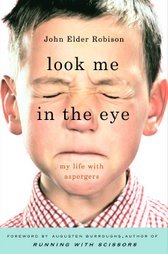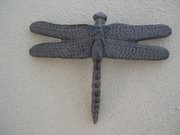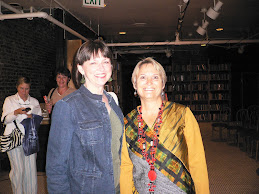Here are some final thoughts on setting that I pulled together from various readings. At the end is a suggested exercise from one of the sources. It's a great way to test yourself. Anyone brave enough to post an exercise here will be rewarded with lots of nice critiques and cyber hugs. No nastiness on this blog. Also, at the end is a link to one of the funniest videos I've seen in a long time. Hope you enjoy it!
Over-describing is tempting because scene description is an opportunity to show off your prose skills through lengthy, elaborate, metaphor-strewn descriptions.
Think of setting as being comparable to a play's set. Most of the time a stage play uses set design to imply the larger setting. The false fronts of buildings, even the elaborate interiors may be realistic, but the audience never mistakes them for real.
Clumping occurs when a writer unloads the entire description at once. The momentum of the scene grinds to a halt while the reader endures paragraph after paragraph of description. To avoid clumping, two things have to happen. First, you have to decide whether all that information is crucial to the scene; does it enhance the scene or are you just showing off? Second, it is usually better to dole out these descriptive details throughout a scene, between more active moments.
So, to avoid clumping, pick the most telling details, find the right place in the scene to give them to the reader, and remember you don't have to give everything at once.
Anytime you see a passage of description that is so poetic and involving that the reader might be tempted to stop to admire the author (you)—cut it. You've just intruded into the story to take a bow, thereby smothering your own creation.
Read through your manuscript once circling all the words that could be stronger. Then go back and take your time replacing them. Do not rely on a thesaurus; many times you'll just be replacing one dull word for a more complex and even duller word.
Setting can be creatively exploited to advance your plot or illustrate a theme of your story.
- As metaphor for the story's theme or the characters' moods and feelings.
- As a plot device.To contribute to the developing story.
- To trigger flashbacks or character introspection.
Exercises:
1. Start a "setting" journal. Begin looking at the world around you with a writer's eye. Make observations about everyday details, such as weather, topography, flora and fauna. But also make note of emotional connections, unusual metaphors, descriptive phrases, sensory responses, etc--anything and everything you observe and experience can be used in your fiction at some point. Start researching foreign or historical settings of interest to you and note your findings in your journal. Keep track of resources such as reference books, articles, websites, etc. for additional follow-up. If your setting research sparks any story or character ideas, be sure to note those as well.
2. From memory, write a descriptive paragraph of a room in your house (or at work, or someone else's house). Once you've finished, take your paragraph to that room and read it, comparing your description with what you see. What changes would you make?
3. Every room has a personality, every room gives off some sort of emotional intensity. A living room may be sterile and make a visitor feel unwelcome. A bedroom might be excessively frilly and make a visitor feel smothered. With that in mind, go to any room in your house. Just as if that room were a character, select the one object in that room that best conveys the room's personality. Describe that object in such a way that the reader feels the emotional effect of that room.
When you're done, enjoy a laugh here: http://www.newsday.com/news/opinion/ny-walt-babyboomers-blurb,0,1036393.blurb










20 comments:
Great info on setting. But that animated video cracked me up! After watching it, I completely forgot the important smart thing I was going to say about your post!
AW, another excellent post and a ton of good information. Now, if I could just apply some of that advice. :-D
LOVE the video!!!
AW, the second part of my writing exercise is going to be about setting. (I can't wait!) You gave me a bunch of cool ideas from your posts. I'm going to refer people back to here, if that's okay.
Lots of great info!!
Thanks!
And who's the cute tree hanging out over here?
Can I call him a boy toy?
Your boy toy?
Will you play nice and pass him around so everybody gets a turn with it?
hahahahaha!
:-)
Ello,
Suffering from memory loss already? Hmmmmm.
Tree,
Thanks. You certainly don't need help in the character building and dialogue departments. Loved your last few entries.
Chris,
Make Leona go away. You're scaring Belle. The video is super cool. Feel free to refer people here at will. And cute Tree is a very talented writer. You should go visit his blog. He manages to pack a powerful emotional punch in there. And, yes he's one of my boy toys, but I'm willing to share unless he objects.
No objection in any way, shape or form. Like a tree, my resource is renewable. Just a little faster. :-D
Excellent advice, AW.
LOL. That video was too crazy! Thanks fo the post on setting. I enjoyed that and the video! :*)
AW: Great post.
I HATE having to cut an especially elegant description, but you're right. You have to be willing to cut anything and everything.
Tree,
Watch out for Chris!
Bernita,
Wish it was mine, but it was culled from various readings from my course.
Demon,
That video is one of my favorites now.
Maya,
It seems like it's a decision an author has to make; write for the reader or for the writer. Cutting is a brave choice.
"Do not rely on a thesaurus; many times you'll just be replacing one dull word for a more complex and even duller word."
Here, here!
Setting is so hard, too. I tend to skip it when I read, so I often don't write it. I then have to layer it in later. But everyone wants varying amounts of it. I once finaled in a contest where I received detailed feedback. One person thought my setting was perfect. One thought that I added too much in a particular scene and it slowed the pacing. And the third? Totally frustrated because I didn't describe every detail. (She wanted me to describe the protagonist's "flowing tresses" within the first few pages, as well as every single other thing. It just would have been a gigantic info dump.) It's so hard to please everybody!
Travis,
I hate reading along and hitting a word so obscure it hasn't been used in a 100 years and having to look it up in the dictionary. It totally stops the flow of the story
Booklady,
It really is a matter of individual taste. That's what keeps all the different genres going.
Great information!
"Anytime you see a passage of description that is so poetic and involving that the reader might be tempted to stop to admire the author (you)—cut it. You've just intruded into the story to take a bow, thereby smothering your own creation."
I love that! So true. I am not much for detail when I'm reading so if I find that paragraph I skip right over it. I have to remind myself as a writer to not do the same thing to my reader.
Writerkat,
I'm with you. If things start dragging, I'm skipping ahead.
I may be a baby boomer, but I am In Denial. But then I really was born to be mild...
And I'm feeling so virtuous: before I visited your blog today I got rid of a whole chapter, though it damn near killed me. The manuscript reads far better, too -- that's the wonderful truth. That chapter was just a bunch of dead wood, however lovingly, painstakingly crafted, so I can vouch for this advice.
I'll keep my eye on her. Thanks for the heads up. :-D
Loved the video! These posts are informative and thought provoking.
I do so love a well turned metaphor, and I hate having to cut a pretty piece of writing. But you're right - showing off is intruding. I tend to please myself with description, though. It's very subjective. The guy who first read my manuscript said there was too much description. The editor who bought it wanted more. **shrug**
As for the vocab, I love it when a good writer sends me to the dictionary once in awhile. Peter Benchley (I think) introduced me to the word stygian, and I managed to sneak it into one of my manuscripts - just because I loved it so much. **bows head in shame**
Now that christineeldin said what I was thinking about the cute tree, I don't feel like such a salacious old broad anymore! Well, I do, but at least I have company. If we're taking turns can I be next?
No offence, tree. Just harmless appreciation.
Post a Comment